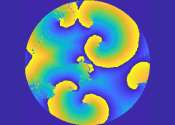Scientists think 'planetary pebbles' were the building blocks for the largest planets
Researchers at Southwest Research Institute (SwRI) and Queen's University in Canada have unraveled the mystery of how Jupiter and Saturn likely formed. This discovery, which changes our view of how all planets might have ...









